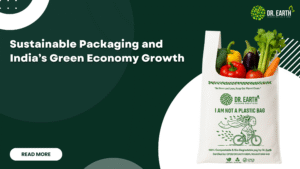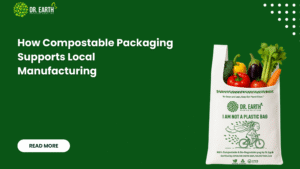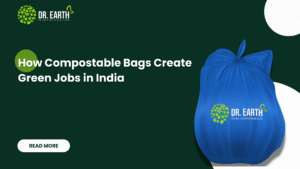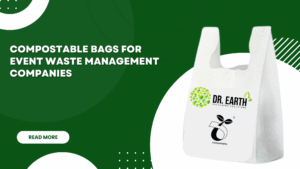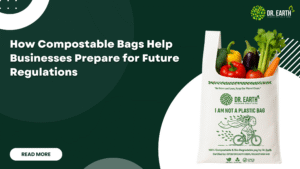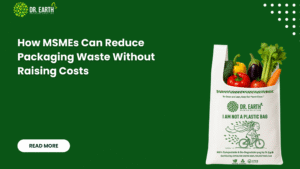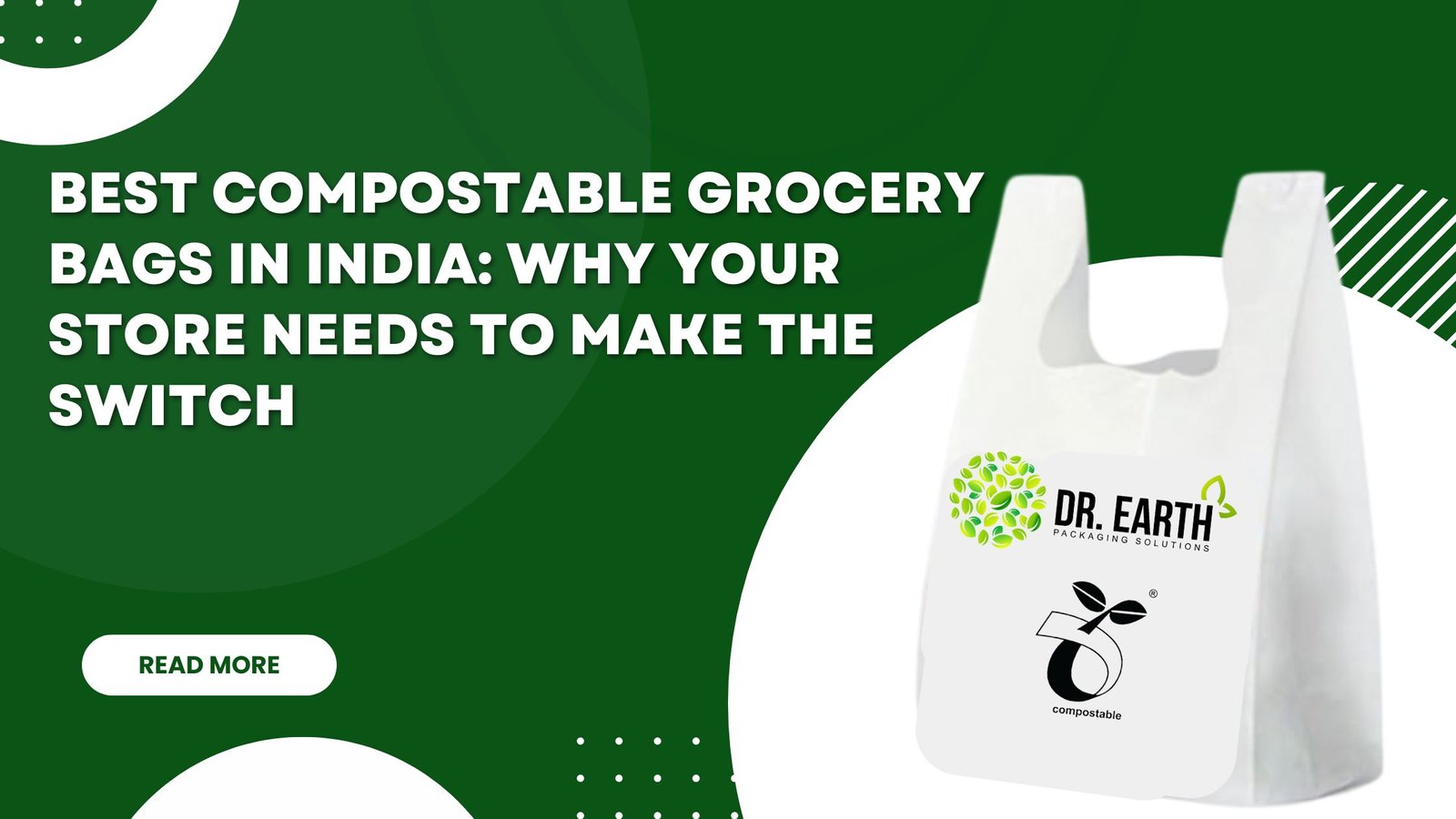
In an ever-changing retail world, one small yet meaningful change can have an impact: a shift away from plastic and to compostable grocery bags. With increased awareness of plastic pollution’s harms across India, it is an exciting time for retailers and customers alike. Grocery retail, be it your neighborhood kirana or one of the big box stores, is now moving beyond sustainable as a marketing/manufacturing tagline to being part of their business practice.
One of the most efficient and visible ways to showcase your environmental responsibility is to switch to certified compostable bags. In this blog, you will see what makes a grocery bag compostable, why it matters in the Indian context, what value it will bring to your store, and where you can find the best compostable grocery bags in India.
Understanding Compostable Grocery Bags
Before we get into their benefits, let’s take a look at what compostable grocery bags are.
Compostable bags are made from plant-based materials, such as cornstarch, PLA (polylactic acid) or PBAT (polybutylene adipate terephthalate). They will decompose dramatically different compared to regular plastic or even oxo-degradable bags. Inside a composting system, compostable bags are fully broken down into carbon dioxide, water, and biomass. Hence compostable bags leave no toxic residue.
Key Features:
- Decomposes in 90-180 days under composting conditions
- Does not leave microplastics or harmful elements
- Safe for soil and plant material
- Produced from renewable, natural resources
- has certification from ISO 17088 (India) or ASTM D6400 (USA) for a compostable product
These bags are the best option for grocery stores as carryouts, vegetable packaging, grain packaging… etc.
The Plastic Problem in Indian Retail
Each day, India produces more than 25,000 tonnes of plastic waste, and single-use grocery bags are a part of this problem. Single-use plastic is now banned in various levels throughout several states in India, but it is difficult to consistently enforce. That is where your responsible businesses come in.
Plastic bags:
- Take hundreds of years to decompose
- Leak toxins into landfills and waterways
- Heads animals and aquatic life
- Biodegrade into our food chain
In comparison, compostable bags can be a solution. They decrease waste, strengthen the company name, and meet customer requirements.
Why Your Grocery Store Should Make the Switch
1. Legal Compliance
There are not only various single-use plastic bag bans in India, but many of these bans have varying levels of compliance. Switching to a compostable option will be legal wherever you are located and you will not have to worry about compliance/fines.
2. Customer Preference
Eco-friendly consumers are actively seeking brands that are making sustainable choices in the grocery sector. Compostable bags are a way to demonstrate your commitment to the planet, gain lasting customers and earn loyalty.
3. Stronger Brand Image
The modern shopping consumer has moved beyond price, and they prefer to use businesses that align with their values. When you offer compostable bags, you build credibility.
4. Operational Safety
Compostable bags are safe for packaging fresh produce and groceries. Unlike plastics, they do not leach and are perfectly suited for food-contact applications.
5. Better Waste Management
When compostable bags are properly disposed of, they return back to the earth harmlessly without polluting it. They also support local composting programs and zero-waste initiatives.
6. Support for Government and Community Goals
By using green packaging options, you can leverage campaigns such as the Swachh Bharat Abhiyan and other sustainability-focused campaigns. This path can lead you to potential awards, grants and other forms of recognition.
What to Look for in Compostable Grocery Bags
It is an important decision selecting a compostable bag supplier to ensure compliance and quality.
1. Certifications
Check that the bags are certified by the CPCB, and check for compliance with the ISO 17088.
2. Material Composition
Bags made from cornstarch, PLA, or PBAT are terrific and effective for retail grocery bags. Do not confusedly use bags that state “bio-plastic” labels, nor bags that claim they are “oxo-degradable.”
3. Strength and Durability
A grocery bag must endure weight, moisture, and handling. Work with suppliers that have bags that have been unpackaged and tested for standard retail conditions found in India as well.
4. Size and Variants
The supplier should provide bags for all different types of products, from small vegetable pouches to large grocery carry bags.
5. Custom Branding
Print your grocery logo and messaging on compostable bags and get branding and sustainability in one product.
Top Compostable Bag Brands in India for Grocery Retailers
Here are some of the compostable grocery bags suppliers in India that are a trusted source of certified compostable grocery bags:
1. Dr. Earth
Dr. Earth leads the sustainable packaging market around compostable bags and has a selection of bags that are perfectly suited for grocery stores.
- Products: Grocery Bags, Carry Bags, Bin Liners, Fruit/Veg Packaging
- Features: IS0 17088 certification, CPCB approval, custom printing available
- Website: https://drearth.co.in/
2. Truegreen
Truegreen is well known for their quality compostable packaging and offers solutions for grocery stores and consumers.
- Strengths: Premium product finish, pan-India service
3. Ecolastic
Ecolastic has a variety of eco-friendly grocery bags and focuses on R&D and customer designed bags.
- Strengths: Multiple sizes and colors, excellent service
4. BioBag India
BioBag India is a global brand offering local solutions. BioBags supplies grocery shopping bags and bulk packaging certified compostable bags.
- Certifications: International and Indian eco-labels
How to Make the Switch in Your Grocery Store
1: Audit Your Current Plastic Usage
- How many bags do you use/day/week/month?
- What sizes are demanded and consumed?
2: Choose a Trusted Supplier
- See if you can request samples
- Check certifications
- Compare prices and bulk, wholesale options
3: Train Your Team
- Explain the importance of the switch
- Instruct in how to store and handle compostable bags (keep dry)
4: Inform Your Customers
- Use in-store signage, receipts, or verbal communication to inform them that you are going green
- Encourage customers to either dispose of or compost the bags correctly
5: Monitor Feedback
- Are customers satisfied with the bags?
- Make adjustments as necessary based on how customers use them.
Addressing the Challenges
1. Compostable Bags Are Costlier
Yes, they are more expensive than plastic. But you can work towards negotiating bulk purchases, give competitive vendors a chance, and educate customers who will appreciate the benefits.
2. Limited Awareness Among Customers
Build signage and educational flyers about why compostable bags are important. Encourage customers reuse or compost them.
3. Storage Concerns
This is the most fragile and sensitive option for a bag, as moisture and heat can affect its quality. Ideally bags should be stored dry and cool, which means they might not be available as much as I offer because they don’t have the same shelf life.
Future of Grocery Retail: Green, Clean, and Customer-Centric
As we move away from basic conscious consumerism, grocery stores and other traditional businesses can take a more active and engaged role in promoting curated and ethical consumption. Use of compostable bags is just one step that all businesses can take to reduce landfill waste and act more sustainably.
Being environmentally and socially responsible isn’t just great public relations; it helps positively engage customers and can encourage them to become supporters of your business as well as advocates for the greater community and environment.
Final Thoughts
Transitioning to compostable grocery bags is not just a decision about packaging. It’s a decision about your brand. It’s a decision about what you believe in. And increasingly, it’s a decision about your competitiveness.
Your supermarket is in a position to shape thousands of customer decisions. Each bag you hand over the checkout counter is a message. Is that message going to be convenience at any cost? Or will it be: “We care about the world that we live in.”
So make the switch. Join the compostable movement. Because the future of retail is not just profitable – it’s sustainable.
FAQs
Q- 1. How are compostable bags different from biodegradable ones?
Ans- Biodegradable bags can leave microplastics. Compostable bags break down fully into safe organic material in composting conditions.
Q- 2. Are compostable bags safe for food items?
Ans- Yes. Certified compostable bags are food-grade and suitable for packaging grocery items.
Q- 3. How long do these bags last in storage?
Ans- Compostable bags can last 6–9 months if stored in dry, cool conditions.
Q- 4. Can I print my grocery store’s branding on compostable bags?
Ans- Yes. Many manufacturers like Dr. Earth offer a printing service.
Q- 5. Where can I buy compostable grocery bags in India?
Ans- Check certified manufacturers like Dr. Earth (https://drearth.co.in/) for bulk orders, samples, and detailed product info.
Share:
Related Posts



